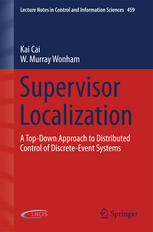

Most ebook files are in PDF format, so you can easily read them using various software such as Foxit Reader or directly on the Google Chrome browser.
Some ebook files are released by publishers in other formats such as .awz, .mobi, .epub, .fb2, etc. You may need to install specific software to read these formats on mobile/PC, such as Calibre.
Please read the tutorial at this link: https://ebookbell.com/faq
We offer FREE conversion to the popular formats you request; however, this may take some time. Therefore, right after payment, please email us, and we will try to provide the service as quickly as possible.
For some exceptional file formats or broken links (if any), please refrain from opening any disputes. Instead, email us first, and we will try to assist within a maximum of 6 hours.
EbookBell Team

5.0
48 reviewsThis monograph presents a systematic top-down approach to distributed control synthesis of discrete-event systems (DES). The approach is called supervisor localization; its essence is the allocation of external supervisory control action to individual component agents as their internal control strategies. The procedure is: first synthesize a monolithic supervisor, to achieve globally optimal and nonblocking controlled behavior, then decompose the monolithic supervisor into local controllers, one for each agent. The collective behavior of the resulting local controllers is identical to that achieved by the monolithic supervisor.
The basic localization theory is first presented in the Ramadge–Wonham language-based supervisory control framework, then demonstrated with distributed control examples of multi-robot formations, manufacturing systems, and distributed algorithms. An architectural approach is adopted to apply localization to large-scale DES; this yields a heterarchical localization procedure, which is also demonstrated with benchmark examples. Moreover, a state-based framework, state-tree structures, is exploited for efficient computation of localization. Finally localization is extended to timed DES, which addresses distributed control synthesis with temporal specifications. The authors’ TCT software and sourcecode will help the reader to reproduce the results demonstrated in the examples.
Academic researchers and graduate students interested in discrete-event and distributed systems and control will find this book an instructive resource. It will also be useful for researchers in manufacturing, supply-chain and logistics and practitioners in related industries.